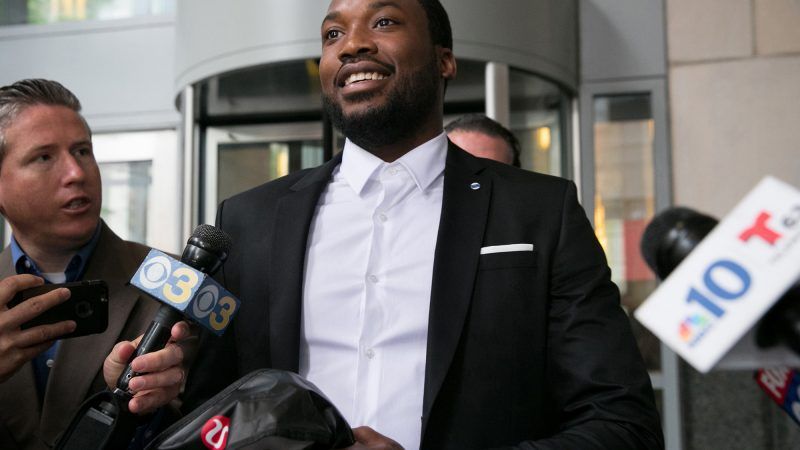A Corrupt Cop Sent Meek Mill to Prison. A Corrupt System Kept Sending Him Back.
The case is a perfect example of the overcriminalization of petty crimes.

More than a decade after his conviction on drug and gun charges, rapper Meek Mill has been granted a new trial. A Pennsylvania appeals court ruled that new evidence likely exonerates him.
Born Robert Rihmeek Williams, Mill was arrested in 2007 after a police officer alleged he pointed a gun at him and was in possession of drugs. Although Mill, then 18 years old, denied the charges, he was sentenced to 11 to 23 months in prison; he served eight months and was released in 2009 and ordered to serve five years probation.
The officer, Reginald Graham, was the linchpin of the case, likely sealing Mill's conviction with his testimony. But Graham was fired from the Philadelphia Police Department after an investigation found that he stole money from the department and lied about it, calling his integrity into question. Another officer came forward after Mill was convicted and disputed Graham's assertion that Mill brandished his gun threateningly. Instead, he says it was clear that he was attempting to discard the weapon.
Considering the new evidence, President Judge Jack A. Panella wrote that "a different verdict will likely result at a retrial."
Mill, now 32, has dealt with the legal saga for the entire course of his adult life. His five-year probation turned into 10 years probation after he violated the terms of the order by leaving Pennsylvania to perform. The decision raised eyebrows around the over-criminalization of petty crimes and the cyclical nature of the criminal justice system, which traps people in its confines by criminalizing things like doing one's job.
Mill was reincarcerated twice over the course of that period and served multiple house arrest stints, as small infractions continued to hound the rapper. In 2011, he racked up his first probation violation when he tested positive for painkillers. In 2014, he spent five months in Hoffman Hall Prison for leaving the country.
And in what was perhaps the most ridiculous turn, Mill appeared before Judge Genece Brinkley again in September 2017 after two misdemeanor arrests. The first pertained to an altercation with paparazzi in a St. Louis airport; that charge was dropped. The second arrest centered around Mill allegedly popping a wheelie on a dirtbike in Manhattan while not wearing a helmet, for which he was charged with reckless driving after police saw an Instagram post. Brinkley sentenced him to two to four years in prison. Mill served another five months.
The Pennsylvania appeals court also removed Brinkley from the case, arguing she had become too involved over the last several years. Last month, District Attorney Larry Krasner's office granted Mill a new hearing related to his 2017 sentencing, arguing that Brinkley "assumed the role of investigator" when she went to a homeless shelter to watch him perform court-ordered community service, and then criticized him for not doing enough.
Mill's 2017 prison sentence sparked renewed outrage, fueling the #FreeMeek movement, which the rapper has since used to shine a broad light on criminal justice issues. "I was really thinking more of, like, free everybody that's caught in these type of situations," he told CBS News, shortly after his conviction was overturned.

Show Comments (17)